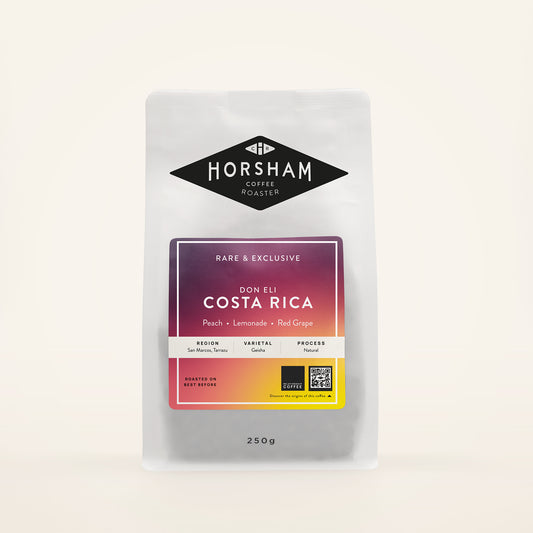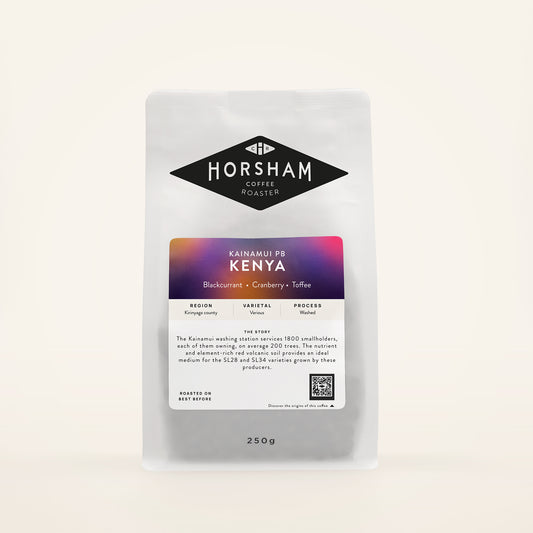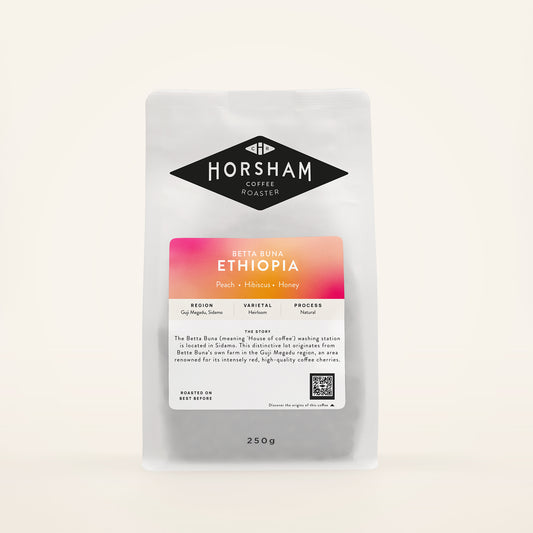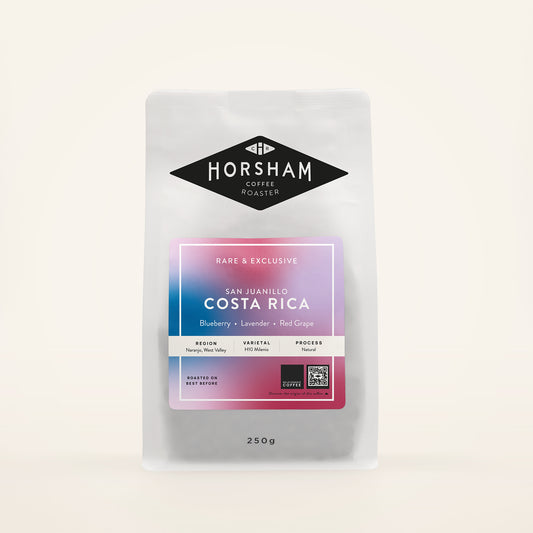Kenya Coffee of the month
Subscribe now and get 50% off your first order
Varietal – SL28, SL34, Ruiru and Barian
Preparation – Washed (extended dry ferment)
Location – Kandara, Murang'a County
Altitude – 1700-1800 masl
Importer - Mercanta
Kenya produces some of the most unique coffees in the world with a unique and distinctive flavour profile that is almost impossible to find anywhere else. It's hard to know precisely why Kenyan coffees have these distinct flavours but it's most likely a combination of factors that include soil, climate, varietals and processing.
Kenyan coffee producers typically grow a mix of SL28, SL38 and small amounts of Ruiru and Batian. The SL coffee varietals are known for producing coffees with vibrant acidity and blackcurrant notes. We've had some fantastic SL28 varietal coffees from Costa Rica that have shown similar flavour profiles to Kenyan coffees.

This coffee comes from small-hold farmers located near to the Ruchu factory and is an AB lot. In Kenya, coffees are sorted by size at dry mills before export. AB is a bean size classification that is slightly smaller than AA. This sizing system has very little to do with flavour, but it does mean that Kenyan coffees are very consistent to roast as bean size is very uniform.
This amazing coffee was imported by Mercanta who have supplied the following information:
'This AB lot was produced by numerous smallholder farmers, all of whom are members of the Ruchu Gacharage Farmers Co-Operative Society delivering to Ruchu Coffee Factory (as washing stations/wet mills are called in Kenya). The factory is located near the town of Kandara, in Kenya's Murang'a County. Ruchu Gacharage FCS has a long history. They formed in 1961, even before Kenyan Independence. They operate 5 factories: Mukangu, Ruona, Gacharage, Kamichee and Ruchu with total membership of around 3,700 small scale coffee growers. Ruchu factory is in an ideal location, not too far from the mid-sized township or Kandara and overlooking the Ruchu River, from where it draws water for pulping and washing coffee. Although the factory is smaller in size, it is sufficient to serve the surrounding community. Currently the mill processes somewhere in the vicinity of 160 metric tonnes of coffee cherry annually. The coffee is grown throughout the region on healthy deep red volcanic soils high in nutrients and organic matter. This soil is ideal for coffee production and give the trees the necessary resources to allocate energy to high-quality coffee production. Harvest generally occurs amongst the cooperative members between October and December. In some cases, early crop can be harvested between April and July.
Processing at the Ruchu wet mill adheres to stringent quality-driven methods. All coffee cherries are handpicked and are delivered to the mill the same day, where they undergo meticulous sorting. Factory employees oversee the process and any underripe or damaged cherries will not be accepted by the 'Cherry Clerk'. One of the most important harvest-period staff, who keeps meticulous records of how much coffee each producer delivers on any given day (and thus how much payment is due once the coffee has sold). Any rejected coffee will have to be taken home again, and the farmer will need to find a place to dry it (often a tarp in the yard) to be delivered only at the end of season as low quality 'Mbuni' – natural process coffee that earns a very low price. Thus, farmer members are incentivised only to pick and deliver the ripest cherry that they can. After being weighed and logged, the weight of the delivery and the farmer's identification are recorded in the Cherry Clerk's register and the cherries are introduced into the hopper to be pulped.
Pulping will only begin when a sufficient quantity of cherries has been received. After pulping, the cherries are delivered to one of the factory's fermentation tanks, where it will ferment for between 12 to 48 hours, depending on the ambient temperature at the time. After this, the coffee is fully washed to remove all traces of mucilage, during which time it will be graded. The coffee will then be soaked in clean water for about 24 hours before it is moved to raised tables to dry in the sun. The coffee will dry here slowly over 2 to 3 weeks, during which time it will be turned regularly and covered during the hottest part of the day. Wastewater from the wet milling process is managed through the use of soaking pits. The water used for processing the cherry will spend time in the pits to ensure that the nutrient-rich water created during de-pulping will not be returned to the nearby water source without proper treatment. This additional step will cut down the risk of contamination, and after adequate time for reabsorption, the water will be recirculated. Some of the issues that farmers face are low production due to loss due to pests and diseases and the relatively high cost of inputs. Many cannot afford to plant disease resistant varieties and face being priced out of the market as their yields diminish. It is perhaps no surprise that many young people in the region see no future in continuing to farm coffee. This is a challenge across much of Kenya, and one that cooperatives such as Ruchu must confront in the future. Ruchu Gacharage FCS also has to compete with tea as an agricultural crop. Many growers across Murang'a and Nyeri have converted their coffee plots into tea, as the crop is harvested year-round and is more readily converted into cash-in-hand. Low prices for coffee have exacerbated this in recent years. High-quality coffee production and care taken with processing are one way to ensure that mono-crops such as tea don't replace the more diverse, integrated smallholder agriculture that is traditional in the region and of which coffee is an integral part.'
Tasting Notes:
This is a great example of a clean, juicy high scoring Kenyan coffee. You can expect a wide range of juicy flavours that include blackcurrant, redberries, rhubarb and candied lemon.




